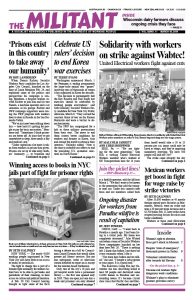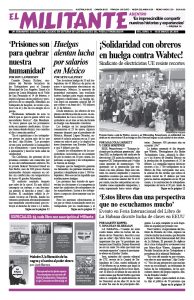Thousands took to the streets of Khartoum and other Sudanese cities to protest the rule of President Omar Hassan al-Bashir Feb. 28, defying the government’s declaration of a state of emergency. The actions are fueled by years of hardship confronting millions of working people across the war-ravaged country.
The protests began in opposition to Bashir’s decision to triple bread prices in mid-December and have since spread to some 35 cities. Inflation, felt most sharply by working people, hit 70 percent at the end of last year. One of the popular chants at the protests calls on Bashir to “fall, that is all!”
“Tomorrow is the day we deliver our voice clearly to the regime of corruption and tyranny, that the will of the people will not break before any measures,” stated the Sudanese Professionals Association, one of the organizers of the protests.
Bashir decreed a yearlong state of emergency Feb. 22, disbanding the federal government and banning public protests and strikes. It gives security forces more powers to search properties, detain people and prevent those arrested from having access to a lawyer. Emergency courts and prosecutors established by the decree can sentence people to 10 years in prison. But the sweeping measures to repress the movement against Bashir’s rule have failed to crush the unrest.
Bashir sacked the country’s 18 provincial governors, appointing officers from the army and the hated National Intelligence and Security Service to act in their place. His restrictions include tighter press censorship and constraints on political parties.
Some 1,000 students at the Ahfad University for Women in Omdurman faced a cop assault on a campus-organized anti-government protest Feb. 25.
Decades of wars, poverty
Bashir seized power in a coup in 1989, backed by the military and Islamist forces. In office he has defended the flogging of women accused of breaching sharia law and shut down most of the country’s cinemas.
Sustained opposition to Bashir’s rule follows the deadly effects on working people of the Sudanese rulers’ years of wars. A decadeslong civil war ended with the independence of South Sudan in 2011.
Bashir has also used his troops, as well as bloodthirsty paramilitary gangs, to repress rebel groups in the South Kordofan, Blue Nile and Darfur regions. Tens of thousands have been killed in the three conflicts and millions forced from their homes.
Before Sudanese independence, the former British colonial rulers solidified their power by fostering divisions among the Sudanese people based on language, religion and national origin — divisions that every government since has perpetuated to bolster its own rule. In Darfur, Bashir’s repression targeted non-Arabic peoples and non-Muslims among the population there.
Many of the current generation of young protesters say they will no longer be divided and defeated by appeals to national and racial differences. Residents of the ZamZam refugee camp who have fled the fighting in Darfur organized an anti-government protest Feb. 28. “We want to build a new Sudan that does not differentiate between a Zurga (black African) and an Arab,” Hassan Adam, a resident of the camp, told the press.
Bashir claims the widespread protests are incited by people from Darfur. In response, demonstrators have chanted, “You arrogant racists, we are all Darfuris.”

